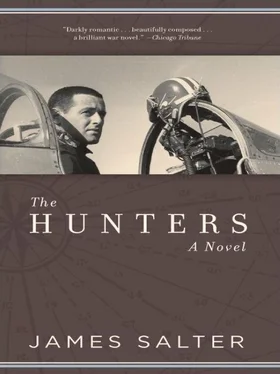“He’s a little different,” he told Moncavage, “maybe not always ready to tell you how good he is, but take it from me. After a few weeks, when he gets a taste of things, you’ll see.”
“He looks competent enough, I’ll say that.”
Imil laughed. He tossed the folded can to the floor.
“Don’t strain yourself,” he said.
“It’s an observation, that’s all.”
“My bet is he has a MIG before you do.”
“I don’t know about that,” Moncavage answered quickly.
Imil glanced down at him, a head shorter and lightly built.
“That bothers you, eh?”
“I’ve been away from flying for a while,” Moncavage began, “I don’t deny it… .”
“What are you trying to say?”
“If it’s something you’d like to bet on…”
Imil slapped his shoulder jovially.
“You’re coming along. I wanted to see what you’d say.”
“Don’t worry about me.”
“You’ll be all right. Just make sure you keep a good wingman with you, that’s all,” Imil grinned.
Moncavage was silent. He’d only had the group for a short time. He knew he wasn’t trusted yet and was working to overcome that. Vaguely he’d begun to fear that he never would. Imil commanded the wing in a heavy-handed way. He never hesitated to intercede in group matters. Moncavage resented that. It was going to be a long, defensive struggle for him to come into real command. He knew he wasn’t stronger than Imil, but he felt he was smarter.
“Make sure he’s a flight commander pretty quick,” Imil said. “He can work on up from there.”
Moncavage said nothing. You run the wing, and I’ll run the group, he thought to himself. He’d rehearsed the phrase before. He nodded in agreement though. He wished he had started calling Imil, a fellow colonel not three years older, Dutch, from the beginning. That, he realized, would have made things better. It was too late now. Self-consciousness had set in. He was even feeling uncomfortable about his trim, soldierly appearance as contrasted with Imil’s, which, while not sloppy, was tough and bearish. He watched as Imil took a last drink of beer and began to crush another can.
As it grew late, the party seemed to intensify. It was going stronger, with the room more crowded, if that was possible, than it had been earlier. Cleve finally left about midnight.
Outside, it had started to snow. Through the darkness swirled a white mist of flakes too delicate to stick to anything. They brushed against his face and made the air seem fresher to breathe. As he walked along the road back to his room, he could hear the subdued sound of singing all the way. When the door slammed behind him, though, the sudden quiet was overwhelming. He sat down on his cot and untied his shoes. He was tired. Somehow, he had the feeling of Christmas away from home, stranded in a cheap hotel, while the snow fell silently through the night, making the streets wet and the railroad tracks gleam.
He was assigned to a squadron. He had to go through a brief training program that involved three or four flights behind the lines, mostly to practice the formations and tactics employed by the group. There were also some lectures on combat procedures, use of the radio, navigation aids, recognition, codes, and so forth. It was all very informal, and the biggest thing was to accomplish the preliminary flying. Aircraft were available only between missions, which usually meant in the middle of the morning or afternoon. Frequently there were none to spare, so for a number of days he had little to do. In bed in the mornings, he could see the sky through a window, a rectangle of blue between the tiled roofs of the buildings.
On the fourth morning, he woke up early. The sky, he noticed, was topped with a high layer of cirrus, as even and regular as the roof tiles or a cobbled street. For a while he lay still in the warm bedding. He could hear the first-light reconnaissance ships running up their engines at the near end of the strip. Beneath the eaves of the barracks the sparrows scurried, ruffled by the wind, giving chilled cries.
It was an effort to swing his feet out over the cold concrete floor and put on his shoes. He did it finally in one hurried moment, not without shivering. Up at last, he shaved in a pan of water that had been on top of the stove all night. It was as hot as a man could stand. He rinsed the shaving cream off with clear hot water dipped with a canteen cup from another container that had been on the stove, and then opened the door and threw it all from the pan onto the bare, hard earth outside. It steamed as it hit the ground and sank in. Then he combed his hair before a blackened mirror, put on a woolen shirt, sweater, and flying jacket, and stepped out to walk down the road to breakfast. The cold air made his nose run and shocked his eyes into complete awakeness.
The Korean mess boys brought him his food on a tray: salty bacon, eggs, toast, and steaming coffee poured from steel pitchers. When he had finished, he smoked a cigarette. This was, so early, contrary to a mild resolution of his, but he did not resist the desire. He made of it the first of that day’s concessions to the shortness of life. After a while he got up and started walking down toward the flight line about a mile away. It was a cold, damp morning. There was a raw wind that made his bones feel brittle. The sun was just rising, its light low across the hills and over the flatlands in which the field was located.
The first mission was taxiing out. The ships, some painted with black-and-white zebra stripes, others with a solid band of yellow, moved along quickly, but they seemed strangely inept on the ground, rolling like cable cars or trolleys. A few of them had red stars stenciled under the cockpit rim. He saw the pilots hunched inside, faceless and inhuman under the helmets and black oxygen masks.
They lined up in pairs on the runway, twelve ships altogether. The engines were run up. The smoke shot backward and skyward. A sustained roar filled the air, a deafening eruption, like an ultimate wind of flame. The noise was brutal, but deep and assuring. It seemed endless. The rear ships quivered in the river of blast. He watched the first two finally go, their rudders flicking slowly from side to side as they began to roll, like the tails of fish holding quietly against a current, rolling very slowly at the start and then quickening until they flowed down the far end of the runway and nosed into the sky. The others followed at close interval.
Desmond was the squadron operations officer, and Cleve had known him, too, in Panama. He was in his office listening to the command radio when Cleve walked in. The whole mission could be followed like that. It was the way the broadcast of a football game would be if there were a microphone in the huddles.
“Sit down, Cleve,” he said. He motioned toward the radio. “They’re just going out.”
“I saw them on my way down here.”
“I don’t expect there’s much of a chance of their running into anything. It’s too early. The MIGs haven’t been flying this early.”
“I’d like to listen, though.”
“Oh, I’m not going to turn it off.”
Cleve stood by the stove to warm himself. A number of the other pilots wandered into the office individually, but none of them stayed long. Desmond introduced Cleve to them when they came in. The encounters were reserved. Cleve felt the calm suspicion with which they regarded him, a newcomer. After a few quiet words, they would ask if there was anything happening on the mission. Then they would leave. There was little coming in over the radio. The ships were still heading north. It was two hundred miles to the Yalu.
“How are the training missions coming along?” Desmond asked.
Читать дальше












